Politics
June 12 Echoes As Ememobong Resigns In Akwa Ibom Political Split
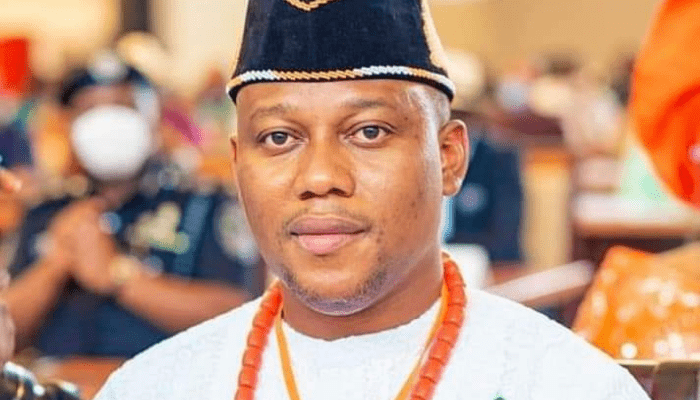
These are interesting times in Nigeria. June 12 is on the lips of many Nigerians today. The date means different things to different people. It would seem that governance has lost its meaning here. There’s a need for a rethink. Last week was especially historic in Akwa Ibom State. A commissioner, Ini Ememobong, refused to follow the “multitude”; he decided to be a lone ranger. There is hope for our country!
June 12: The pang and fury linger 32 years after
The commemoration of June 12, 1993, today will be a mixed bag. For some Nigerians, it will be an occasion of rolling out the drums and clinking of glasses in celebration, but for many others, it will catapult them back to the feeling of the pang and fury of that unfortunate moment.
Precisely 32 years ago, a presidential election was held in Nigeria, the first since the military coup ended the Second Republic.
The election held so much hope for the country. It was organised by the military junta led by Ibrahim Badamasi Babangida (IBB) through the National Electoral Commission (NEC) superintendent Humphrey Nwosu, a professor.
The election was a straight fight between Moshood Kashimawo Olawale (MKO) Abiola of the Social Democratic Party (SDP) and Bashir Tofa of the National Republican Convention (NRC).
It was one of the most peaceful elections in the history of Nigeria, but the winner was never declared, as the exercise was annulled by IBB, citing electoral irregularities.
The annulment ushered in a chain of political instability, leading to the forced “stepping aside” of Babangida and the installation of a weak interim government headed by Ernest Shonekan.
Shonekan was later shoved aside by General Sani Abacha who imposed himself as the head of state.
The chains of crises that arose following the annulment, including the brutal assassination of Kudirat Abiola and the unexplainable death of MKO Abiola in Abacha’s gulag, led to the death of many innocent citizens in some parts of the South West geo-political zone where Abiola hailed from.
Before then, dozens of Nigerians had died either on the road or in their villages as they fled Lagos and some other states across the country for fear of an outbreak of war.
Normalcy began to return following the sudden death on July 7, 1998, of Abacha and the enthronement of Abdulsalami Abubakar as the new head of state.
The belief that Abiola won the annulled election has been widespread in the country, but the media have always cautiously used the phrase ‘presumed winner’.
But things began to get clearer as to the real winner of the 1993 presidential election when Goodluck Jonathan, in a bid to recognise and immortalise Abiola, named some national monuments after him.
“The Federal Government has decided that late Chief MKO Abiola should be honoured. “In honour of Chief MKO Abiola, the University of Lagos is renamed the Moshood Abiola University,” Jonathan said on May 29, 2012.
This, however, elicited wide controversy, leading to stepping back by the government.
President Muhammadu Buhari took the recognition a notch higher when he moved Democracy Day from May 29 of every year to June 12.
But if anybody was still in doubt as to whether or not Abiola indeed won that election, such was cleared on Thursday, February 20, 2025, when Babangida, during the launch of his autobiography, ‘A Journey In Service’, in Abuja, made the confession.
He, however, shifted the blame of the annulment to his subordinates, chiefly, Abacha.
It would not be out of place to say that most, if not all, the actors in the nation’s political space today are beneficiaries of the annulment one way or another.
What has become a sing-song in the polity is that the democracy that has existed since 1999 may not be the same version envisioned by MKO Abiola when he contested to lead the country.
Apart from the fact that the so-called democracy has helped to further the cause of a few politicians, the multitude of citizens are still locked in the neglect that was their lot during the jackboot era.
Many families remember June 12 as a black day in their lives as a result of incalculable personal losses they suffered following the annulment of the presidential election. It is, indeed, a day to forget or remember depending on the speaker and the audience.
Most state actors have a very wrong definition of governance. For many of those who occupy executive offices, their understanding of good governance begins and ends with road construction. They will tell you how many kilometres of road they have constructed in a year; never mind that the cost of such constructions is usually inflated or ‘padded’ in Nigerian parlance.
Some years ago, while deploring the claim of road construction as the beginning and end of good governance, Pat Utomi, a professor of political economy, said that the long-lasting investment any government can make is in human capacity development.
He also said that no matter how solid a road is, it would go bad after some years of usage.
He recalled when the Lagos-Ibadan Motorway was newly constructed, and it used to take him about 30 minutes to get to Ibadan from Lagos. He said that despite the investment and the good efforts of the then government, the road still went bad, and successive governments and administrations have continued to carry out multi-billion-naira rehabilitation work on the same road.
Good governance is about a framework for how organisations and governments should operate, emphasising accountability, transparency, and the rule of law. While good roads are a sine qua non of development, they must not be taken as the only focal point of governance or the fulcrum around which it revolves.
Nigerians hear about too many road constructions and their commissioning, but their lives have not been positively impacted by this road infrastructure. Would it not rather be great to spread the funds to other amenities that also have a direct and lasting impact on the lives of the people? Just thinking aloud.
A trophy for Ememobong
On the day Governor Umo Eno of Akwa Ibom State gave a marching order to his commissioners and other aides to either fall in or fall out, almost all members of his cabinet, except one, responded, “His Excellency lives forever; on your mandate we shall stand.”
Eno had given a subtle threat to anyone who may refuse to follow him to his new party; all his commissioners, except Ini Ememobong, decided to follow the governor to guarantee a constant flow of the stomach infrastructure.
On the eve of the defection and the razzmatazz associated with it, Ememobong, commissioner for Special Duties and Ibom Deep Seaport, nailed his own version of “95 theses”, as it were, at the wall of the Government House, Uyo, Akwa Ibom State, through a well-crafted resignation letter that neither denigrated nor abused the governor but simply acknowledged their individual rights to their ideological differences.
Ememobong, through his boldness and candour, has shown that not everybody is crazy about being in government by all means.
At a time in the country when there is famine and many people are desperate to grab a political post and hang in there so far as it guarantees them a regular flow of income, Ememobong decided to toe the path of biblical Daniel, bluntly refusing Governor Eno’s steaming pot of porridge.
“Daniel purposed in his heart that he would not defile himself with the portion of the king’s meat nor with the wine which he drank…” (Daniel 1:8).
As Martin Luther was vehement, defending his faith, arguing that the “Just Shall Live by Faith” and that work alone was not sufficient to guarantee anybody entrance into the kingdom of God, a belief at variance with what the leaders of his church held so dear, he was told to recant. To this, he replied, “My conscience is captive to the word of God. This, I cannot and will not recant, because acting against one’s conscience is neither safe nor sound. Here I stand; I can do no other. God help me.”
At the young age of 41, Ememobong would have easily chosen to continue with the governor and perhaps have his eyes on a bigger pie at the centre. But he strongly believes that “So then, it is not of him that willeth, nor of him that runneth, but of God that sheweth mercy.”
His decision to join his former boss, Udom Emmanuel, who by reason of Eno’s defection has been left in the cold, as it were, is a lesson in loyalty.
Ememobong simply remembered yesterday, when Emmanuel insisted on him as commissioner and gave him the free hand to operate.
In a country where conscience does not matter in politics, successors have always severed relationships with their predecessors when they consider themselves “arrived”. Governor Eno may have considered himself “arrived” and decided to ditch his former boss in the most horrendous way. I hear you ask feebly; didn’t Emmanuel do the same to Godswill Akpabio? That is a story for another day.
Ememobong deserves a space in the Nigerian history book for his shining example and proving that not every Nigerian can afford to sell his/her birthright for a pot of porridge.
May I propose a toast for Comrade Iniobong Ememobong, ‘Politician of the Half Year 2025’, for his audacity, good-naturedness, selflessness and principled stand when it mattered most!
Businessday.ng
Politics
BREAKING: “Serial Disrespect” Sparks Drama As Senate Order Arrest Of Tinubu’s Appointee
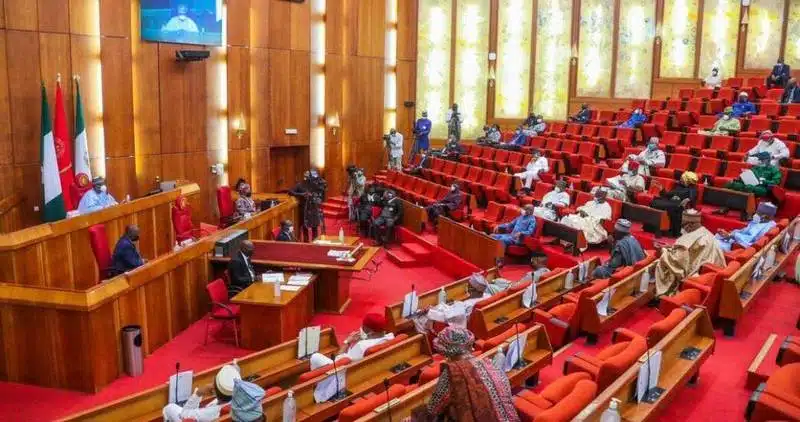
The Senate has asked President Bola Tinubu to immediately remove the Registrar General of the Corporate Affairs Commission (CAC), Hussaini Ishaq Magaji (SAN), from his office.
As reported by Nigerian Tribune, the Senate committee on finance, while passing a resolution in Abuja on Thursday, February 26, accused Magaji of failing to honour the upper legislative chamber’s invitations to account for the finances of his agency.
Senator Sani Musa, the chairman of the committee, said:
“He (Magaji) refused on so many occasions to honour our invitation to appear before this committee.
“We have issues with the reconciliation of the revenue of CAC.
“Each time we invite him, he gives us excuses.
” Magaji was appointed to this position by President Tinubu on October 13, 2023.
As the registrar-general of the CAC, Magaji is expected to work for the development and regulation of corporate affairs in Nigeria.
Meanwhile, President Tinubu on Wednesday night, February 25, formally urged the Senate to begin the process of amending the 1999 constitution to provide for the establishment of state police, declaring that Nigeria must urgently restructure its security architecture to confront terrorism, banditry and insurgency.
Speaking at an interfaith breaking of fast with the leadership and members of the Senate at the State House, Abuja, the president stated that the time had come for lawmakers to “start thinking” about embedding state policing in the constitution to enable governments at subnational levels better secure their territories.
The Nation quoted President Tinubu as saying:
“Nigeria is extremely challenged, we are facing terrorism, banditry, insurgency, but you never failed to make a right response to these calls.
“What I will ask for tonight is for you to start thinking how best to amend the Constitution to incorporate the state police for us to secure our country, take over our forests from marauders, free our children from fear.”
Politics
Opposition Leaders Urge N’Assembly To Begin Fresh Electoral Act Amendment
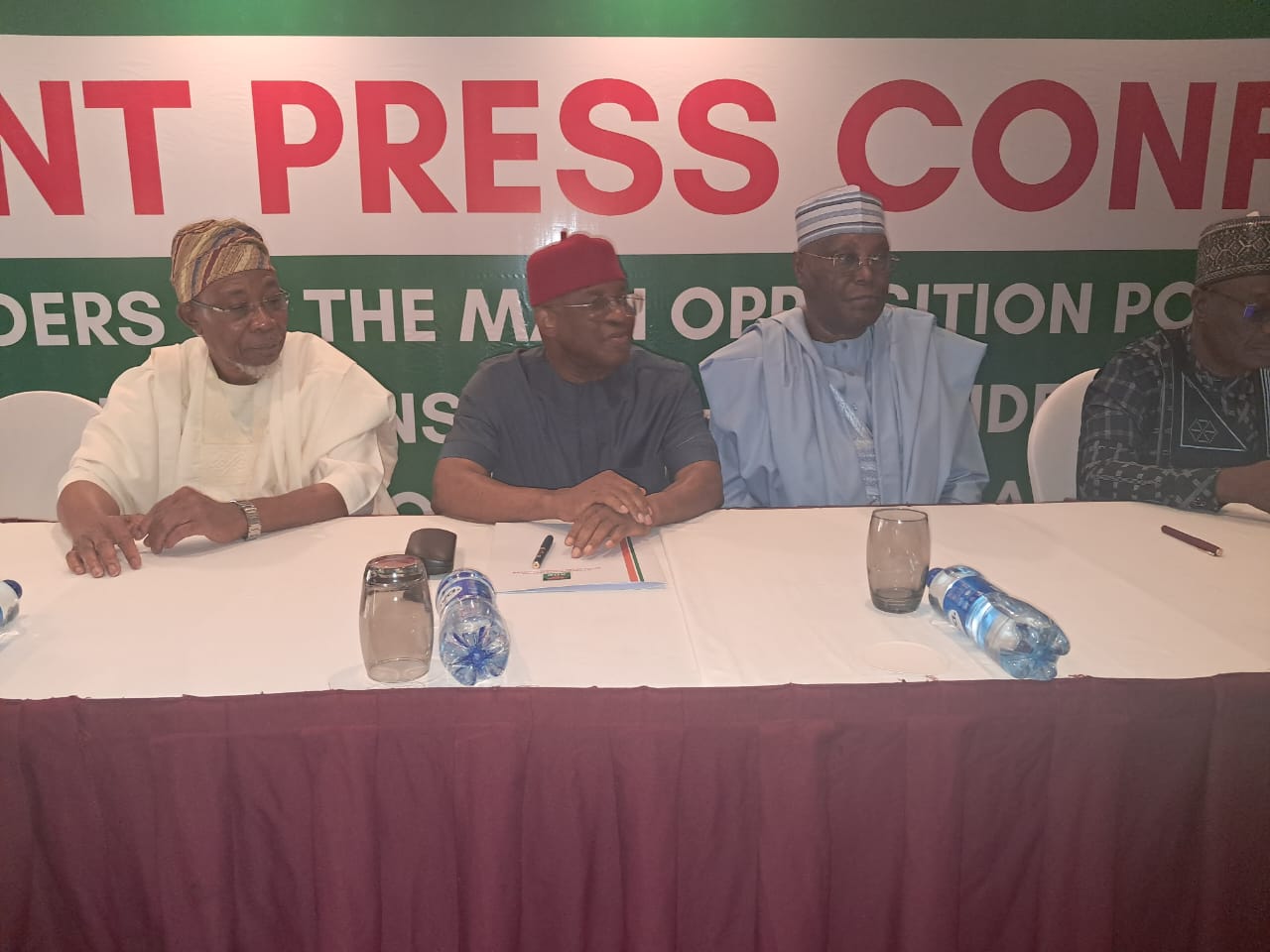
Leaders of the African Democratic Congress and the New Nigeria Peoples Party have called on the National Assembly to commence a fresh process to amend the Electoral Act.
Speaking on behalf of the opposition at a press conference in Abuja on Thursday, NNPP National Chairman, Ajuji Ahmed, urged federal lawmakers to expunge all objectionable provisions contained in the Act.
Prominent opposition figures at the meeting included former Senate President David Mark; NNPP chieftain Buba Galadima; former Vice-President Atiku Abubakar; and the 2023 presidential candidate of the Labour Party, Peter Obi.
Also in attendance at the Lagos/Osun Hall of Transcorp Hilton, Abuja, were the ADC National Secretary, Rauf Aregbesola; former Rivers State Governor Rotimi Amaechi; and the party’s National Publicity Secretary, Bolaji Abdullahi, alongside other stakeholders.
Others present included Senator Dino Melaye, former ADC National Chairman Ralph Nwosu, and former Cross River State Governor Liyel Imoke, among several dignitaries.
Politics
Assembly Confirms Popular Redeemed Pastor As Deputy Governor
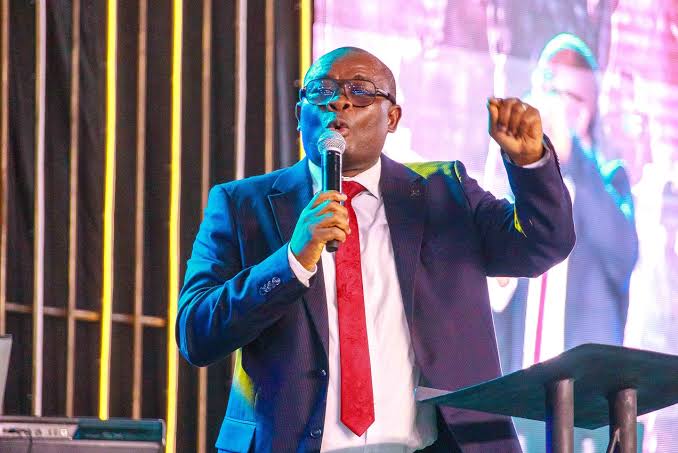
The Bayelsa state house of assembly has approved the appointment of Peter Akpe as the deputy governor of the state.
Akpe, a pastor, served as chief of staff to Douye Diri, governor of Bayelsa, prior to his nomination.
Ordained clergy by the Redeemed Christian Church of God (RCCG), Akpe has had a career spanning the civil service and politics.
He served in the Rivers and Bayelsa state civil services before transitioning fully into politics.
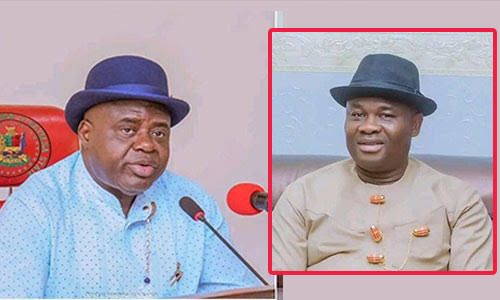
Akpe was a two-term member of the Bayelsa state house of assembly from 2011 to 2019, serving as majority leader throughout his stint in the legislature.
He also served as commissioner between 2008 and 2011 under the Seriake Dickson administration.
The approval clears the way for his swearing-in as deputy governor.
Akpe’s appointment follows the death of Lawrence Ewhrudjakpo, the former deputy governor, who passed on last December.
-

 Politics2 days ago
Politics2 days agoAssembly Confirms Popular Redeemed Pastor As Deputy Governor
-

 Foreign2 days ago
Foreign2 days agoCabinet Reshuffle: President Sacks Finance Minister
-

 Business2 days ago
Business2 days agoJUST IN: 13 Banks May Shut Down In March As CBN Confirms 20 Safe For Recapitalisation Deadline
-

 Politics12 hours ago
Politics12 hours agoBREAKING: “Serial Disrespect” Sparks Drama As Senate Order Arrest Of Tinubu’s Appointee
-

 Politics13 hours ago
Politics13 hours agoOpposition Leaders Urge N’Assembly To Begin Fresh Electoral Act Amendment
-

 Opinion12 hours ago
Opinion12 hours agoEdo State To Spend N1billion On Armoured Car For Speaker, N4.6billion On Vehicles For Lawmakers




